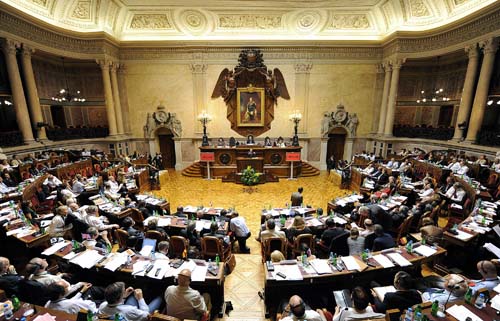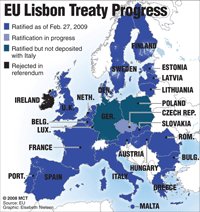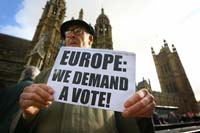 Francisco Leong/AFP/Getty Images
Francisco Leong/AFP/Getty Images
Article
Most expect Europe to take another step toward political unity this year. What is the Treaty of Lisbon, and what does it mean for the EU and the world?
Learn the why behind the headlines.
Subscribe to the Real Truth for FREE news and analysis.
Subscribe NowThe dream of a united Europe, which empires there have previously attained through history, is alive and well.
With the formation of the European Economic Community (EEC) in the 1950s, most of Europe has slowly progressed toward fulfilling this dream.
The European Union (EU) currently consists of 27 member states and nearly 500 million citizens, and produces the world’s greatest gross domestic product, at $14.96 trillion.
Yet the EU is not a single legal entity, but remains a fragile union of independent states, unable to sign international treaties, for instance. Therefore, its involvement in geopolitical relations and processes is bureaucratic and inefficient.
For example, the EU attempted to pass into law a European Constitution in 2004, which most considered a natural “next step” in becoming a unified legal entity. However, the majority of France and the Netherlands voted against it in 2005.
Three years later, the European Union signed the Treaty of Lisbon, intending that all member states ratify the new laws by the end of 2008, and it be in force for the 2009 European elections. Yet a June 2008 referendum in Ireland resulted in “no,” putting the treaty’s implementation on hold. The Irish government will seek to ratify it, via a second referendum, by October 2009.
However, what is the Treaty of Lisbon? Does it differ from the formerly proposed European Constitution, and if so, how?
Recent History
Several treaties currently govern the European Union. For example, the 1957 Treaty of Rome formed the EEC, which the 1992 Treaty of Maastricht amended to form the EU and prepare for the Euro. Both the 1997 Treaty of Amsterdam and the 2001 Treaty of Nice consisted of amendments to the Rome and Maastricht treaties. All of these treaties and many others remain in force to this day.

In addition, the member states require unanimity to amend any of the EU treaties, which partly explains the difficulty and inefficiency that the European Union faces.
In 2001, the European Council—the highest political body of the EU, consisting of the heads of state of all members—established the European Convention, chaired by former French President Valéry Giscard d’Estaing. Its purpose was to produce a draft constitution. After much debate, the Convention presented the final text in June 2004.
A major goal of the constitution was to replace all overlapping treaties with one set of fundamental laws for Europe: 18 member states ratified the constitutional text; seven postponed their process following the Netherland’s and France’s rejection.
When it was Germany’s turn to take over the six-month rotating EU presidency in 2007, German Chancellor Angela Merkel declared the “period of reflection” that followed the failed ratification of the constitution to be over. During the 50th anniversary of the Treaty of Rome, in March of that year, Germany led all member states to adopt the Berlin Declaration, consisting of a timeline for a new treaty to replace the failed constitution.
That June, the European Council met in Brussels and negotiated a new treaty, addressing key issues. The Polish government was concerned about European Council voting; the United Kingdom and Poland were concerned with the EU Charter of Fundamental Human Rights being able to overturn domestic law; and Dutch citizens desired a greater role for national parliaments in the EU decision-making process.
Completed by October, the member states signed the treaty into law two months later in Lisbon.
Ratification was to take place during 2008, with the expectation that the new treaty would enter into force by Jan. 1, 2009.
The Treaty of Lisbon
As the preamble states, the purpose of the treaty is “to complete the process started by the Treaty of Amsterdam (socioeconomic standards, broader immigration and civil judicial oversight, protection and enforcement of human rights, and an increase in the power of the European Parliament) and by the Treaty of Nice (largely preparation for the admission of new members from eastern Europe, adjustments to the power of the Commission, and adjustments to voting rules to allow easier passage of laws), with a view to enhancing the efficiency and democratic legitimacy of the Union and to improving the coherence of its action.”
Significant changes introduced with the Treaty of Lisbon include more qualified majority voting in the EU Council. Therefore, “a majority vote in the Council of Ministers (which represents national governments) will be carried if 55% of nations representing 65% of the overall EU population say yes” (The Economist).
More importantly, “majority voting will become the rule in some 50 policy areas currently decided by unanimity: most dramatically migration, criminal justice and judicial and police co-operation, where the European Court of Justice (ECJ) will also gain broad oversight for the first time” (ibid.).
This will significantly increase the ability to change and/or introduce law, as well as its enforcement.
The Treaty of Lisbon will also eliminate the pillar system—the co-existence of three separate and equal bodies that make up the EU: the European Community, the Common Foreign and Security Policy, and the Police and Judicial Co-operation in Criminal Matters. All functions will merge into the European Union as a single entity, thus enabling it to have a “legal personality”—including the ability to sign international treaties.
The treaty will create two significant offices—President of the European Union and High Representative for Foreign Affairs—presenting a united position on EU policies. The treaty also allows member states to push ahead with military co-operation.
Commenting on the current six-month rotation of the EU presidency, former U.S. Secretary of State Henry Kissinger once asked, “If I want to call Europe, who do I call?”
The new President will be voted into office by the members of the European Council, and will sit for a renewable, two-and-a-half-year term.
The new High Representative for Foreign Affairs will have political power, a substantial budget and a diplomatic corps. In effect, he or she will serve as the continent’s Foreign Minister, speaking on behalf of the European Union, such as before the United Nations.
Finally, if ratified, the Treaty of Lisbon will make the Union’s human rights charter—the Charter of Fundamental Rights—legally binding. The BBC reported that the UK secured a written guarantee that the charter could not be used to alter British law.
Nonetheless, experts are divided on how effective this will be. The bottom line: Most of the above was part of the original constitution treaty, and that “most European leaders acknowledge that the main substance of the constitution would be preserved” (ibid.).
The Implications
Because it is a reform treaty (in fact, it is also known as the Reform Treaty), it is amending previous treaties rather than replacing them, as the constitution would have. Consequently, almost all member states have been able to ratify the Lisbon Treaty without holding national referendums.
The constitution contained articles regarding the symbols of the European flag, an anthem, and a motto. While these will continue to exist, they are not part of the Lisbon treaty.
Several countries will continue to hold “opt-out” clauses on various policies, namely Ireland and the UK regarding asylum, visas and immigration; Poland possibly in regard to the Charter of Fundamental Rights; and Denmark regarding justice and home affairs. While these members have garnered political points at their respective homes, they also provide for the possibility that certain countries may find themselves someday on the outside, looking in. This could take form via the “two-speed” Europe, or even possibly with some current members completely outside any formal union.
Some politicians, however, hold a skeptical view, accusing their nations’ governments of propaganda. For example, UK Labour MP Gisela Stuart, who was a member of the European Convention that wrote the original constitution, maintains that 96 percent of the Treaty of Lisbon is a “word-for-word carbon copy”—significant enough that the British people should be first asked, via a referendum. She calls it a “deeply dishonest process” (BBC).
 Ben Stansall/AFP/Getty Images
Ben Stansall/AFP/Getty ImagesHarry van Bommel, spokesman for the Dutch Socialist Party, insists the creation of the new president and the foreign minister imply a significant transfer of sovereignty to the European level, “without any satisfactory democratic control being exercised over this.” He continued, “In our view, it’s up to the people to decide whether to transfer sovereignty to the EU” (BBC).
A December 2008 Economist article stated the EU, under French President Nicolas Sarkozy, was a glimpse of what the world might be like should the Reform Treaty be successful. Mr. Sarkozy’s leadership was described as a “thundering pace and reckless disregard for the rules”—something Europe is not used to, yet (at least in part) desires.
Due to circumstances (the Irish “no” vote, the 2008 Russian-Georgian War, the current world economic crisis), Mr. Sarkozy did not have time to consult and identify the consensus view. Consequently, his bold leadership startled some and angered others, bypassing the EU foreign policy chief in proposing a peace deal in Georgia. In addition, at an EU-Russia summit, his statements regarding American missile-defense in Poland and the Czech Republic were beyond the normal for safe, middle-of-the-road Europe. He, in a sense, “acted as if the Lisbon treaty were already in force” (The Economist).
In summing up his stint as EU president, Mr. Sarkozy maintained that a strong Europe depends on its “strong nations.” Although the larger European countries do not have more legal rights than the smaller nations, he added they do have more “responsibilities.”
The Delay
Several issues have delayed implementing the treaty. As already mentioned, Ireland voted against it in a national referendum. Under EU rules, a treaty cannot come into force if any of the 27 member states fail to ratify it.
 Stringer/AFP/Getty Images
Stringer/AFP/Getty ImagesHaving obtained pledges from the EU addressing various concerns voiced by Irish voters, the Irish government has agreed to hold a second referendum by October of this year. It is unclear as to what will happen if the treaty fails a second time.
Currently, according to a January 2009 Angus-Reid poll, 55 percent of respondents said they would vote in favor of the treaty; 37 percent said they would oppose it.
Elsewhere, both the Czech Republic and Poland have yet to ratify it. Czech President Vaclav Klaus is a Euro-skeptic, and does not like the Treaty of Lisbon. Even the Czech Prime Minister Mirek Topolanek has tied his country’s willingness to ratify the treaty to the proposed installment of a U.S. radar base. As for Poland, President Lech Kaczynski insists on waiting until the Irish question is resolved.
A significant concern regarding the elections for the European Parliament, to occur June 4-7, 2009, among the EU member nations, is that the Irish delay may offer the opportunity for more debate across Europe on the treaty.
It is likely the global economic crisis could bear political consequences, and may have an effect on either the Irish, or the European Parliament vote. The International Herald Tribune indicated that “the leader of the Irish ‘no’ campaign, Declan Ganley, said he wanted to field candidates opposed to the Lisbon Treaty in all 27 countries, giving them the ‘referendum they didn’t have.’”
Nick Clegg, leader of Britain’s Liberal Democrat Party, said that mainstream pro-Europeans would need to respond with “ever more clarity and the need to be more engaged” (ibid.).
“There is no doubt,” Mr. Clegg added, “that in the teeth of recession with people losing their jobs and worrying about putting food on the table, an angry message of rejection of the status quo could go down well. It is a fertile time for populism and simplicity.”
Also potentially complicating the issue is the British Conservative Party’s position that if elected, it would scrap the Lisbon Treaty altogether. According to the Irish Times, Conservative leader David Cameron has put his party on election alert amid speculation that UK Prime Minister Gordon Brown might call a snap election to take advantage of his rising popularity due to his handling of the recession.
The British Conservatives maintain the treaty dilutes national sovereignty by transferring too much power to Brussels, the EU capital.
In an interview with the Financial Times, Mr. Cameron said there was a 50/50 chance for an election as early as April. If the Conservatives won, he stated, they would hold a national referendum on the Treaty of Lisbon by October, and lead a “no” campaign against it. This would wreak havoc on the Irish vote and potentially doom the treaty, throwing the EU into a major crisis.
The Future
The treaty’s immediate future remains unclear. Other factors, such as the economic crisis, an election in the UK, or some other major geopolitical event (such as the outcome of the Israeli election, and possible action against Iran) could have a significant role.
Nevertheless, here is what we do know. First, the EU is becoming desperate for changes allowing a stronger, more unified leadership and control of its resources. Second, the Treaty of Lisbon is essentially the same as the European Constitution, and provides for these needs. Third, Bible prophecy indicates we are near the time of the seventh and final restoration of the Holy Roman Empire. (For more information, read our literature Who or What Is the Beast of Revelation?)
Mr. Sarkozy said, “It is ‘untrue’ that institutions stop Europe from taking decisions” (The Economist).
Europe’s problem is a lack of political will—but that will is on the verge of becoming strong and obvious.
- Real Truth Magazine Articles
- EUROPE
 Out of the Ashes – The Rise of Europe – Part 1
Out of the Ashes – The Rise of Europe – Part 1
More on Related Topics:
- Spain Is Granting Legal Status to Potentially 500,000 Immigrants
- Bulgaria’s Government Resigns After Mass Protests
- 10 Years After the Bataclan Massacre, Paris Is Still Scarred by That Night of Terror
- French Government Collapses in 14 Hours, Deepening Political Crisis
- French Parliament Ousts Prime Minister, Deepening Political Crisis


